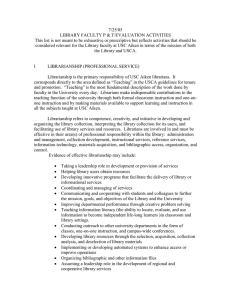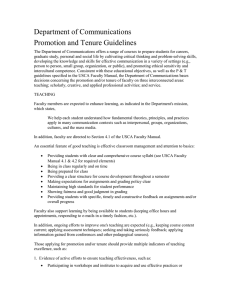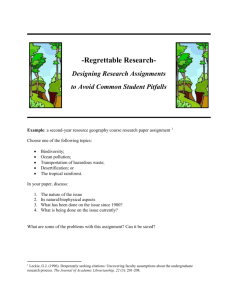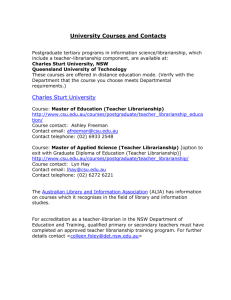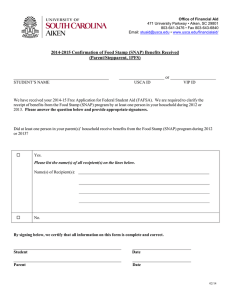4/1/15 LIBRARY FACULTY P & T/ EVALUATION ACTIVITIES
advertisement
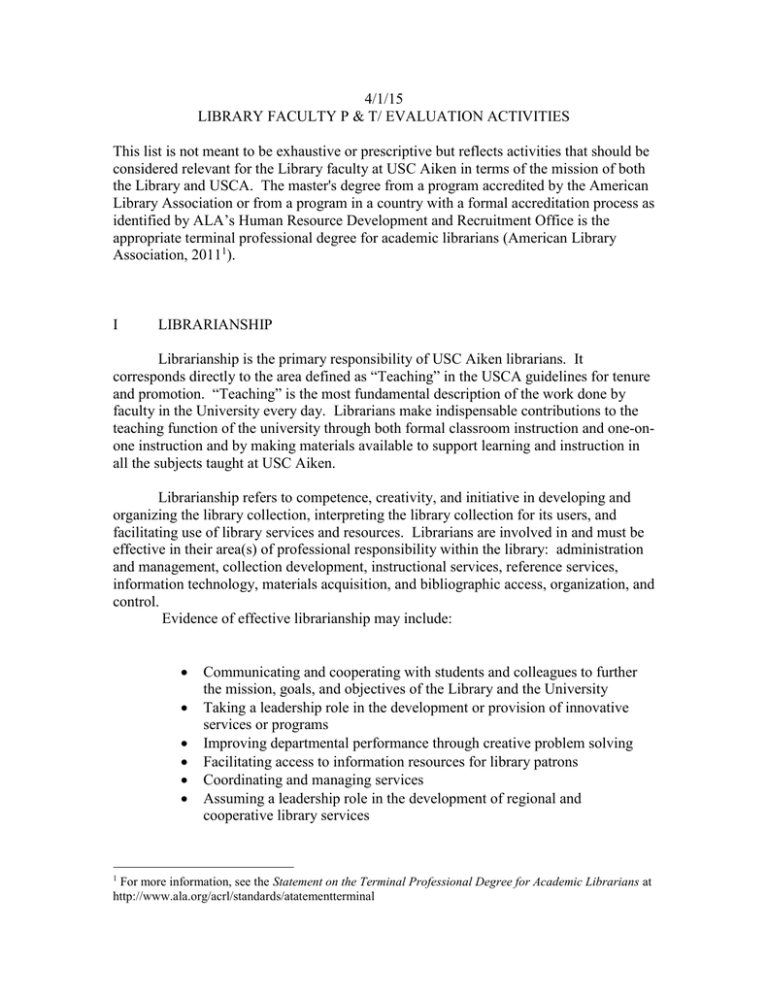
4/1/15 LIBRARY FACULTY P & T/ EVALUATION ACTIVITIES This list is not meant to be exhaustive or prescriptive but reflects activities that should be considered relevant for the Library faculty at USC Aiken in terms of the mission of both the Library and USCA. The master's degree from a program accredited by the American Library Association or from a program in a country with a formal accreditation process as identified by ALA’s Human Resource Development and Recruitment Office is the appropriate terminal professional degree for academic librarians (American Library Association, 20111). I LIBRARIANSHIP Librarianship is the primary responsibility of USC Aiken librarians. It corresponds directly to the area defined as “Teaching” in the USCA guidelines for tenure and promotion. “Teaching” is the most fundamental description of the work done by faculty in the University every day. Librarians make indispensable contributions to the teaching function of the university through both formal classroom instruction and one-onone instruction and by making materials available to support learning and instruction in all the subjects taught at USC Aiken. Librarianship refers to competence, creativity, and initiative in developing and organizing the library collection, interpreting the library collection for its users, and facilitating use of library services and resources. Librarians are involved in and must be effective in their area(s) of professional responsibility within the library: administration and management, collection development, instructional services, reference services, information technology, materials acquisition, and bibliographic access, organization, and control. Evidence of effective librarianship may include: 1 Communicating and cooperating with students and colleagues to further the mission, goals, and objectives of the Library and the University Taking a leadership role in the development or provision of innovative services or programs Improving departmental performance through creative problem solving Facilitating access to information resources for library patrons Coordinating and managing services Assuming a leadership role in the development of regional and cooperative library services For more information, see the Statement on the Terminal Professional Degree for Academic Librarians at http://www.ala.org/acrl/standards/atatementterminal II Public speaking activities presenting issues in the field of librarianship to campus groups Conducting outreach to other university departments or constituents Teaching information literacy (the ability to locate, evaluate, and use information to become independent life-long learners) in classroom and library settings. Teaching semester long classes including, but not limited to, critical inquiry and honors colloquium Authoring library orientation and instructional materials Developing library resources through the selection, acquisition, collection analysis, and deselection of library materials Demonstrating subject knowledge and professional expertise used to build, preserve, or organize collections, including archives and digital libraries Implementing, developing or managing automated systems to enhance access or improve operations Organizing bibliographic and other information files Creating and managing web pages Enhancing effectiveness as a librarian through attendance at workshops, seminars, training sessions, or other forms of professional development Attainment of additional academic degrees or other appropriate credentials Supervision of student internships, student employees and/or library staff Service as an academic advisor to students SCHOLARLY/CREATIVE/APPLIED PROFESSIONAL ACTIVITIES Scholarship is defined as research in the academic discipline of librarianship and the incorporation/integration/application of the scholarship into the practice of librarianship. Scholarship may take several forms such as basic research in the discipline resulting in publication and/or presentation, applied scholarship that includes interpretation of librarianship to improve teaching or service, and/or professional development, which would include attendance at conferences/classes/workshops. In any endeavor, the quality of the work is more important than the quantity. Evidence of refereed products is expected in order to receive tenure. Examples include: Submission and/or publication of articles in peer reviewed journals Submission and/or publication of books or chapters in books or textbooks Submission and/or publication of articles in professional journals Submission and/or presentation of peer-reviewed poster sessions based on empirical research and presented at professional meetings and conferences Submission and/or acceptance of peer reviewed papers or presentations for professional meetings and conferences Publication in conference proceedings III Presentation of research at professional meetings and conferences Participation on panels at conferences Participation, presentation or publication of interdisciplinary scholarship Participation in the gathering of materials for archival purposes, including oral histories Participation in other creative activities related to the librarian's specialization Reviews of books, other literature, software, websites, manuscripts Service as a peer reviewer of grant proposals or scholarly publications Grant research, writing, and administration Current research which has not resulted in publication Service on editorial review panels Achievement of professional awards, certification, or other recognition Compilation of extensive bibliographies, indexes, and other reference works UNIVERSITY/PROFESSIONAL/COMMUNITY SERVICE By participating in University, professional, and community service, Library faculty bring together elements of service that contribute to USCA. Service may be demonstrated in several areas but is not necessary in all. University service involves the faculty member’s contributions to the effective functioning of the academic department or the university as a whole. Service on Faculty Assembly standing committees, campus task forces, ad hoc committees, and search committees is strongly encouraged. Evidence should include descriptions of issues dealt with by the committees along with how often committees met. Professional service refers to the faculty member’s service to the profession of librarianship. Community service is the faculty member’s service to the community at large, when it is related to the faculty member’s field of expertise or when it promotes the mission of USCA. The burden is on the faculty member to explain how such community service promotes the mission of USCA. Remuneration for university or community service will not lessen nor increase the worth of such contributions. University Service on departmental, college, or university committees Service as a mentor to new faculty Assistance to other faculty members Planning or participation in special projects or events Creation, preparation or publication of reports Participation on search committees Service as an advisor to a student organization Professional Participation in professional organizations through chairing committees or sections, moderating discussion, presiding over meetings, or other forms of active service Consulting services Service on regional accrediting teams Community Service activities to community patrons such as reference assistance, preparation of special reports, instruction sessions for teacher cadets or local high school classes, other outreach projects to special populations in the local area, such as the Academy of Lifelong Learning, etc. Active participation in local community public service organizations, which reflects on or results from position at USCA Public speaking activities on behalf of the University and/or the GreggGraniteville Library Facilitation and disposition of personal book/journal collections of community members
